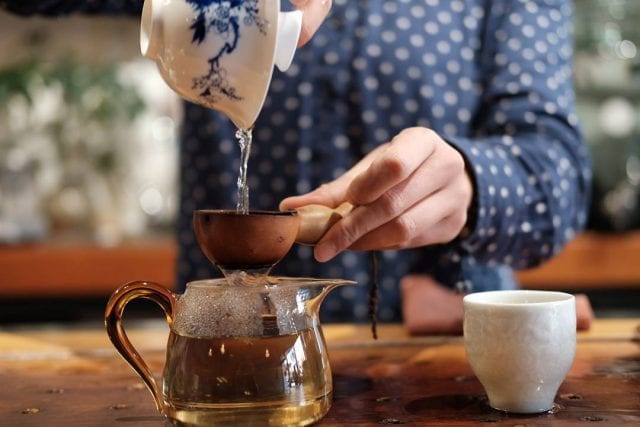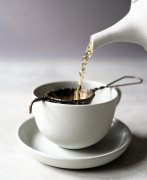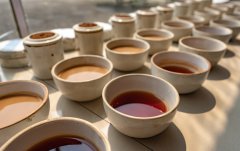Can I drink black tea with a bad stomach? Causes, efficacy, effects and side effects of astringent black tea
We have noticed that many customers do not drink black tea or raw Pu'er tea because of stomach discomfort. I have had a similar experience. I have a stomachache after drinking black tea. However, it has nothing to do with black tea or raw Pu'er tea. If the raw material of tea is not right, any kind of tea will have the same uncomfortable effect. However, if tea is made of suitable materials, we can enjoy any kind of tea even on an empty stomach. It is summer tea that causes all kinds of problems. according to our experience, summer tea has a strong astringent taste and is easy to cause stomachache. In warm seasons, especially in summer, tea contains a special substance. When this kind of tea is processed into any kind of tea, it tastes very astringent and causes stomachache. For the same reason, Darjeeling Erchong also has a strong astringent taste. If the tea is processed into mature Pu'er tea or deep-baked oolong tea, its astringency can be ignored. I have experienced the same trend in natural herbs. In Japan, I often go to the mountains to collect natural herbs. In spring, these herbs are sweet and strong. These herbs are also available in summer. However, it becomes very bitter and astringent in summer. It is impossible to enjoy them in summer. For making black tea or raw Pu'er tea, the best quality is the tea harvested at the beginning of spring. Usually the first batch of corn harvested in spring is very sweet and delicate. It is absolutely not astringent. However, black tea and raw Pu'er tea are usually picked late in summer. The taste of the second and third brewing tea is not so delicate and soft, but it is still acceptable. After picking tea for four times, the tea has an obvious astringent taste. In China, the price of the first tea is twice as much as that of the second tea. The price of picking tea for three or four times is much lower. Due to the high demand, the early harvest of spring tea is very limited. In the famous tea-producing areas, tea-picking activities were carried out more than 10 times. This means that the chance of picking spring tea for the first time is less than 10%. Considering the great demand for first-picked tea in China, most of the existing black tea or raw Pu'er tea abroad are late-picked tea. This is why many people have negative experiences with black tea and Pu'er tea. If it is the first kind of tea in spring, it is completely unconvergent and has a very mild effect on the stomach, no matter how strong we make the tea, even when the stomach is empty.

The root cause of astringency the question now is what substances in tea can cause stomachache and astringency. We should be able to identify it if we investigate which substances are particularly abundant in summer tea. I found these figures on page 22 of Yamanishi's Japanese book, the Science of Tea. The results showed that the content of epigallocatechin gallate (Epigallocatechin gallate EGCg) increased significantly in summer. They monitored four different kinds of tea. Zuoqi No. 1 is a Yabukita variety, No. 2 is a Qingxin Wulong variety, No. 3 is a Benihomare variety, and the last is an Assam variety from Sri Lanka. Spring means spring and summer means summer. Another article, B Schwarz, T Hofmann-European Food Research and Technology, October 2008, explained in the abstract that epigallocatechin gallate has a strong binding ability to protein. Susanne Scharbert, Nadine Holzmann, Thomas Hofmann, J. Agric . Food chemistry. A sensory study was carried out on the astringent substances in tea. The following table shows the taste thresholds of various polyphenols. The data show that epigallocatechin gallate has the strongest convergence effect. Based on these data, we can conclude that epigallocatechin gallate is a substance that causes acerbity in the stomach. The mechanism of astringency caused by EGCg our oral cavity and stomach cavity are made up of proteins. If any substance binds to the protein layer, it will have an astringent and uncomfortable feeling. Tea with milk has the least effect on convergence and on the stomach because epigallocatechin gallate has been reacted by milk protein and no longer reacts. To sum up, the astringency or stomach discomfort of tea has nothing to do with the processing process or type of tea, but is directly affected by the materials of tea. If these teas were made from spring tea picked for the first time, we would not have tasted any astringency or stomachache.
Important Notice :
前街咖啡 FrontStreet Coffee has moved to new addredd:
FrontStreet Coffee Address: 315,Donghua East Road,GuangZhou
Tel:020 38364473
- Prev

How is the quality of Nepal's alpine black tea authentic? what are the brands of Nepal black tea? how much is it per jin?
We bought very interesting black tea from Nepal. The tea garden is located behind the Himalayas and opposite Darjeeling. International Maritime Organization certified organic tea garden among many tea gardens in Nepal, we chose JunChiyabari tea garden. The tea garden adopts natural farming methods. They don't use nitrogen fertilizer.
- Next

How does black tea ferment to produce flower fragrance? how to deal with the humidity? how to deal with the fruit aroma of black tea?
There is an obvious difference in taste between fermented black tea and poorly fermented black tea. Well-made black tea gives off sweetness, while poorly made black tea gives off sour or musty taste. Observe the color, understand the skills in addition, the tea will show the effect of fermentation. Fermented tea produces a yellowish red liquid, while
Related
- Is Dirty the cold version of Australian White? What is the difference between dirty coffee/decent coffee and Australian white espresso?
- Relationship between brewing time and coffee extraction parameters How to make the brewing time fall to 2 minutes?
- Got entangled?! Lucky opens a new store, Mixue Ice City, and pursues it as a neighbor!
- How long is the shelf life of high-quality hand-brewed hanging ear coffee? Why is the taste period of hanging ear coffee ground into powder only one month?
- Why does hand-brewed espresso smell good but taste bitter? Is the flavor of high-quality hand-brewed coffee aroma or taste?
- Special treatment? COSTA's China business was evaluated separately!
- Match with Xi Tea?! Lucky will launch the new "Snow Cheese Grapes"
- What is the recommended proportion of water temperature and grinding time for hand-flushing Huakui coffee beans? What parameters should be used for cold extraction and cold brewing hand-brewed Huakui coffee?
- Share the most detailed golden formula for cold extract coffee making on the whole network! What proportion of ground is used to make cold coffee brewed for several hours?
- What are the advantages of segmented water injection for hand-brewed coffee? How many stages should I fill the water when making coffee and what is the best time for grinding the water temperature?

